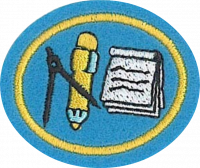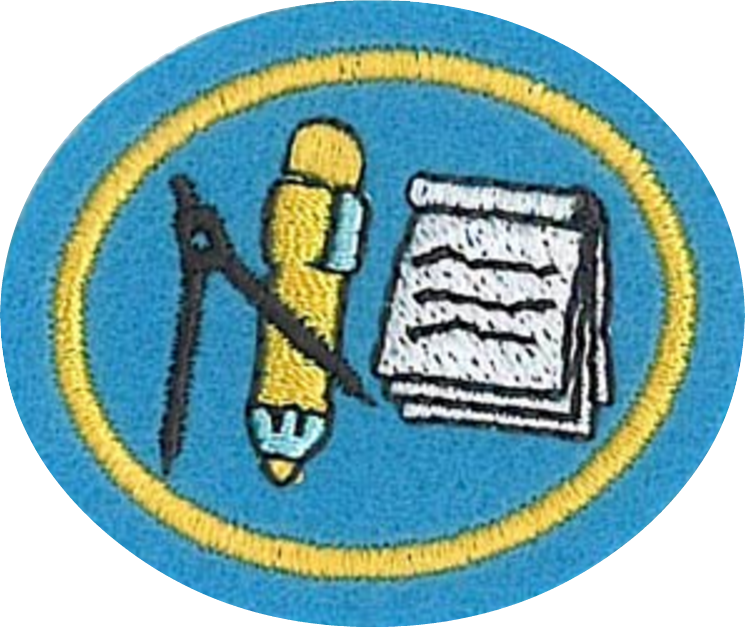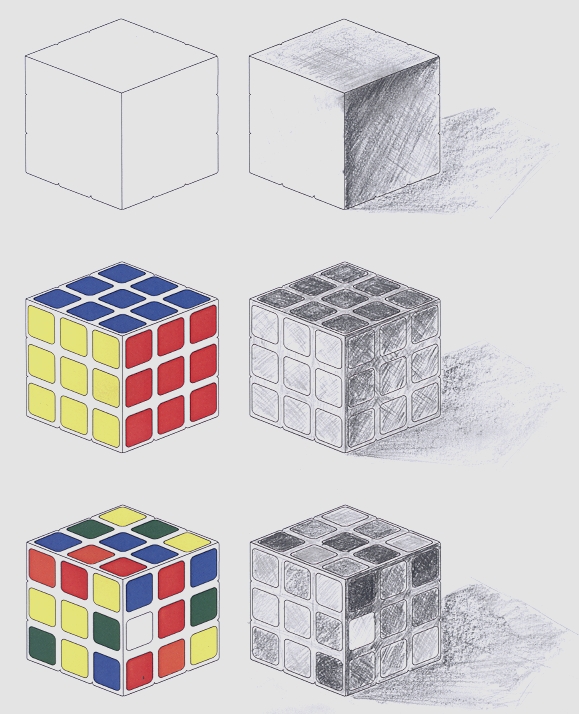Difference between revisions of "AY Honors/Drawing/Answer Key"
(+insignia) |
m |
||
| (24 intermediate revisions by 5 users not shown) | |||
| Line 1: | Line 1: | ||
| − | {{ | + | {{HonorSubpage}} |
| − | + | <noinclude><translate><!--T:56--> | |
| − | + | </noinclude> | |
| − | {{ | + | {{:AY Honors/Notes/Drawing and Painting|Drawing}} |
| − | + | <noinclude></translate></noinclude> | |
| − | ==1. Make a list of Drawing Media. | + | <section begin="Body" /> |
| + | {{ansreq|page={{#titleparts:{{PAGENAME}}|2|1}}|num=1}} | ||
| + | <noinclude><translate><!--T:22--> | ||
| + | </noinclude> | ||
| + | <!-- 1. Make a list of Drawing Media. --> | ||
*Pencils | *Pencils | ||
*Pens | *Pens | ||
| Line 17: | Line 21: | ||
*Color markers | *Color markers | ||
| − | ==2. What is Chiaroscuro? | + | <!--T:23--> |
| − | Chiaroscuro is the powerful use of shading/light and dark in works of art. | + | <noinclude></translate></noinclude> |
| + | {{CloseReq}} <!-- 1 --> | ||
| + | {{ansreq|page={{#titleparts:{{PAGENAME}}|2|1}}|num=2}} | ||
| + | <noinclude><translate><!--T:24--> | ||
| + | </noinclude> | ||
| + | <!-- 2. What is Chiaroscuro? And what effect does it have on drawing? --> | ||
| + | Chiaroscuro is the powerful use of shading/light and dark in works of art. Value adds dramatic effects and form to an otherwise dull drawing. | ||
| − | ==3. Draw a Value Scale with at least 10 different values. | + | <!--T:25--> |
| + | <noinclude></translate></noinclude> | ||
| + | {{CloseReq}} <!-- 2 --> | ||
| + | {{ansreq|page={{#titleparts:{{PAGENAME}}|2|1}}|num=3}} | ||
| + | <noinclude><translate><!--T:26--> | ||
| + | </noinclude> | ||
| + | <!-- 3. Draw a Value Scale with at least 10 different values. --> | ||
| + | <!--T:6--> | ||
[[File:Values (Drawing and Painting).jpg||Grey scale assigned Value numbers]] | [[File:Values (Drawing and Painting).jpg||Grey scale assigned Value numbers]] | ||
| + | <!--T:7--> | ||
[[File:Cube Puzzles.jpg||Cube Puzzles - showing value mapping]] | [[File:Cube Puzzles.jpg||Cube Puzzles - showing value mapping]] | ||
| − | + | <!--T:27--> | |
| − | + | <noinclude></translate></noinclude> | |
| − | ==4. What is the best way to begin drawing until you are sure all sizes, placement and proportions are correct? | + | {{CloseReq}} <!-- 3 --> |
| + | {{ansreq|page={{#titleparts:{{PAGENAME}}|2|1}}|num=4}} | ||
| + | <noinclude><translate><!--T:28--> | ||
| + | </noinclude> | ||
| + | <!-- 4. What is the best way to begin drawing until you are sure all sizes, placement and proportions are correct? --> | ||
Draw lightly so if mistakes are made they are easier to erase. | Draw lightly so if mistakes are made they are easier to erase. | ||
| − | ==5. Know the difference between eye level, bird’s eye view and worm’s eye view. | + | <!--T:29--> |
| + | <noinclude></translate></noinclude> | ||
| + | {{CloseReq}} <!-- 4 --> | ||
| + | {{ansreq|page={{#titleparts:{{PAGENAME}}|2|1}}|num=5}} | ||
| + | <noinclude><translate><!--T:30--> | ||
| + | </noinclude> | ||
| + | <!-- 5. Know the difference between eye level, bird’s eye view and worm’s eye view. --> | ||
| − | ==6. Show foreground, middle ground and background in a simple landscape. | + | <!--T:31--> |
| + | <noinclude></translate></noinclude> | ||
| + | {{CloseReq}} <!-- 5 --> | ||
| + | {{ansreq|page={{#titleparts:{{PAGENAME}}|2|1}}|num=6}} | ||
| + | <noinclude><translate><!--T:32--> | ||
| + | </noinclude> | ||
| + | <!-- 6. Show foreground, middle ground and background in a simple landscape. --> | ||
| − | ==7. What is a “multi-media” drawing? | + | <!--T:33--> |
| + | <noinclude></translate></noinclude> | ||
| + | {{CloseReq}} <!-- 6 --> | ||
| + | {{ansreq|page={{#titleparts:{{PAGENAME}}|2|1}}|num=7}} | ||
| + | <noinclude><translate><!--T:34--> | ||
| + | </noinclude> | ||
| + | <!-- 7. What is a “multi-media” drawing? --> | ||
A multi-media drawing is one that uses more than one media (see requirement one for a list of media). | A multi-media drawing is one that uses more than one media (see requirement one for a list of media). | ||
| − | ==8. Explain Linear Perspective and list at least 4 ways to achieve it when drawing a landscape. | + | <!--T:35--> |
| − | Linear Perspective is showing depth or distance in your drawing. | + | <noinclude></translate></noinclude> |
| + | {{CloseReq}} <!-- 7 --> | ||
| + | {{ansreq|page={{#titleparts:{{PAGENAME}}|2|1}}|num=8}} | ||
| + | <noinclude><translate><!--T:36--> | ||
| + | </noinclude> | ||
| + | <!-- 8. Explain Linear Perspective and list at least 4 ways to achieve it when drawing a landscape. --> | ||
| + | Linear Perspective is showing depth or distance in your drawing. Here are some techniques: | ||
| + | <!--T:13--> | ||
{|border=1 | {|border=1 | ||
!Technique!!Effect | !Technique!!Effect | ||
| Line 56: | Line 103: | ||
|} | |} | ||
| − | ==9. Draw a cylindrical object and a rectangular object grouped together a little below the eye, showing proper perspective, light and shade. | + | <!--T:37--> |
| − | + | <noinclude></translate></noinclude> | |
| − | + | {{CloseReq}} <!-- 8 --> | |
| − | + | {{ansreq|page={{#titleparts:{{PAGENAME}}|2|1}}|num=9}} | |
| − | + | <noinclude><translate><!--T:38--> | |
| − | + | </noinclude> | |
| + | <!-- 9. Draw a cylindrical object and a rectangular object grouped together a little below the eye, showing proper perspective, light and shade. --> | ||
| − | ==11. Draw an animal using simple shapes such as squares, triangles, rectangles.== | + | <!--T:39--> |
| − | + | <noinclude></translate></noinclude> | |
| − | + | {{CloseReq}} <!-- 9 --> | |
| + | {{ansreq|page={{#titleparts:{{PAGENAME}}|2|1}}|num=10}} | ||
| + | <noinclude><translate><!--T:40--> | ||
| + | </noinclude> | ||
| + | <!-- 10. Understand and describe these types of subject matter: --> | ||
| + | <noinclude></translate></noinclude> | ||
| + | {{ansreq|page={{#titleparts:{{PAGENAME}}|2|1}}|num=10a}} | ||
| + | <noinclude><translate><!--T:41--> | ||
| + | </noinclude> | ||
| + | <noinclude></translate></noinclude> | ||
| + | {{CloseReq}} <!-- 10a --> | ||
| + | {{ansreq|page={{#titleparts:{{PAGENAME}}|2|1}}|num=10b}} | ||
| + | <noinclude><translate><!--T:42--> | ||
| + | </noinclude> | ||
| + | <noinclude></translate></noinclude> | ||
| + | {{CloseReq}} <!-- 10b --> | ||
| + | {{ansreq|page={{#titleparts:{{PAGENAME}}|2|1}}|num=10c}} | ||
| + | <noinclude><translate><!--T:43--> | ||
| + | </noinclude> | ||
| + | <noinclude></translate></noinclude> | ||
| + | {{CloseReq}} <!-- 10c --> | ||
| + | {{ansreq|page={{#titleparts:{{PAGENAME}}|2|1}}|num=10d}} | ||
| + | <noinclude><translate><!--T:44--> | ||
| + | </noinclude> | ||
| + | |||
| + | <!--T:45--> | ||
| + | <noinclude></translate></noinclude> | ||
| + | {{CloseReq}} <!-- 10d --> | ||
| + | {{CloseReq}} <!-- 10 --> | ||
| + | {{ansreq|page={{#titleparts:{{PAGENAME}}|2|1}}|num=11}} | ||
| + | <noinclude><translate><!--T:46--> | ||
| + | </noinclude> | ||
| + | <!-- 11. Draw an animal using simple shapes such as squares, triangles, rectangles. --> | ||
| + | |||
| + | <!--T:47--> | ||
| + | <noinclude></translate></noinclude> | ||
| + | {{CloseReq}} <!-- 11 --> | ||
| + | {{ansreq|page={{#titleparts:{{PAGENAME}}|2|1}}|num=12}} | ||
| + | <noinclude><translate><!--T:48--> | ||
| + | </noinclude> | ||
| + | <!-- 12. Make a freehand sketch of an animal, showing in values the distribution of color. --> | ||
| + | |||
| + | <!--T:49--> | ||
| + | <noinclude></translate></noinclude> | ||
| + | {{CloseReq}} <!-- 12 --> | ||
| + | {{ansreq|page={{#titleparts:{{PAGENAME}}|2|1}}|num=13}} | ||
| + | <noinclude><translate><!--T:50--> | ||
| + | </noinclude> | ||
| + | <!-- 13. Make a drawing of some landscape near your home. --> | ||
Remember, you can’t draw the whole world in your piece, so choose a small section for this landscape. | Remember, you can’t draw the whole world in your piece, so choose a small section for this landscape. | ||
| − | ==14. Draw and shade in a still life. | + | <!--T:51--> |
| + | <noinclude></translate></noinclude> | ||
| + | {{CloseReq}} <!-- 13 --> | ||
| + | {{ansreq|page={{#titleparts:{{PAGENAME}}|2|1}}|num=14}} | ||
| + | <noinclude><translate><!--T:52--> | ||
| + | </noinclude> | ||
| + | <!-- 14. Draw and shade in a still life. --> | ||
Make it personal and interesting; add personal touches and objects that you are excited about - this will make your artwork more fun and easier for you to finish. | Make it personal and interesting; add personal touches and objects that you are excited about - this will make your artwork more fun and easier for you to finish. | ||
| − | ==15. Memorize Psalm 33:6, and discuss how it relates to Drawing. | + | |
| + | <!--T:53--> | ||
| + | <noinclude></translate></noinclude> | ||
| + | {{CloseReq}} <!-- 14 --> | ||
| + | {{ansreq|page={{#titleparts:{{PAGENAME}}|2|1}}|num=15}} | ||
| + | <noinclude><translate><!--T:54--> | ||
| + | </noinclude> | ||
| + | <!-- 15. Memorize Psalm 33:6, and discuss how it relates to Drawing. --> | ||
{{Bible verse | {{Bible verse | ||
|book=Psalm | |book=Psalm | ||
| Line 79: | Line 188: | ||
}} | }} | ||
| − | ==References== | + | <!--T:55--> |
| − | *Drawing on the Right Side of the Brain, | + | <noinclude></translate></noinclude> |
| + | {{CloseReq}} <!-- 15 --> | ||
| + | <noinclude><translate></noinclude> | ||
| + | ==References== <!--T:17--> | ||
| + | *Drawing on the Right Side of the Brain, Betty Edwards | ||
| + | <noinclude></translate></noinclude> | ||
| + | |||
| + | [[Category:Adventist Youth Honors Answer Book/Do at home{{GetLangSuffix}}]] | ||
| + | {{CloseHonorPage}} | ||
Latest revision as of 01:35, 4 January 2023
The Drawing honor was created in 2013 when the NAD Honor Taskforce voted to expand and replace the Drawing and Painting honor with four new honors: Drawing, Drawing - Advanced, Painting, and Painting - Advanced. The new Painting honors adopted the insignia for the old Drawing and Paining honor, and the new Drawing honor received a new insignia.
1
- Pencils
- Pens
- Crayons
- Color pencils
- Pastels
- Chalk
- Charcoal
- Graphite
- Ink
- Paint
- Color markers
2
Chiaroscuro is the powerful use of shading/light and dark in works of art. Value adds dramatic effects and form to an otherwise dull drawing.
3
4
Draw lightly so if mistakes are made they are easier to erase.
5
6
7
A multi-media drawing is one that uses more than one media (see requirement one for a list of media).
8
Linear Perspective is showing depth or distance in your drawing. Here are some techniques:
| Technique | Effect |
|---|---|
| Placing an object high on the page | Looks far away |
| Placing an object lower on the page | Looks closer |
| Size | Smaller are far away/larger are close |
| Overlapping | objects you don’t see all of are farther away |
| Detail and color | Close objects will have more detail, texture and darker
color than objects in the distance. |
9
10
10a
10b
10c
10d
11
12
13
Remember, you can’t draw the whole world in your piece, so choose a small section for this landscape.
14
Make it personal and interesting; add personal touches and objects that you are excited about - this will make your artwork more fun and easier for you to finish.
15
“By the Word of God were the heavens made; and all the host of them by the breath of His mouth.”
References
- Drawing on the Right Side of the Brain, Betty Edwards




